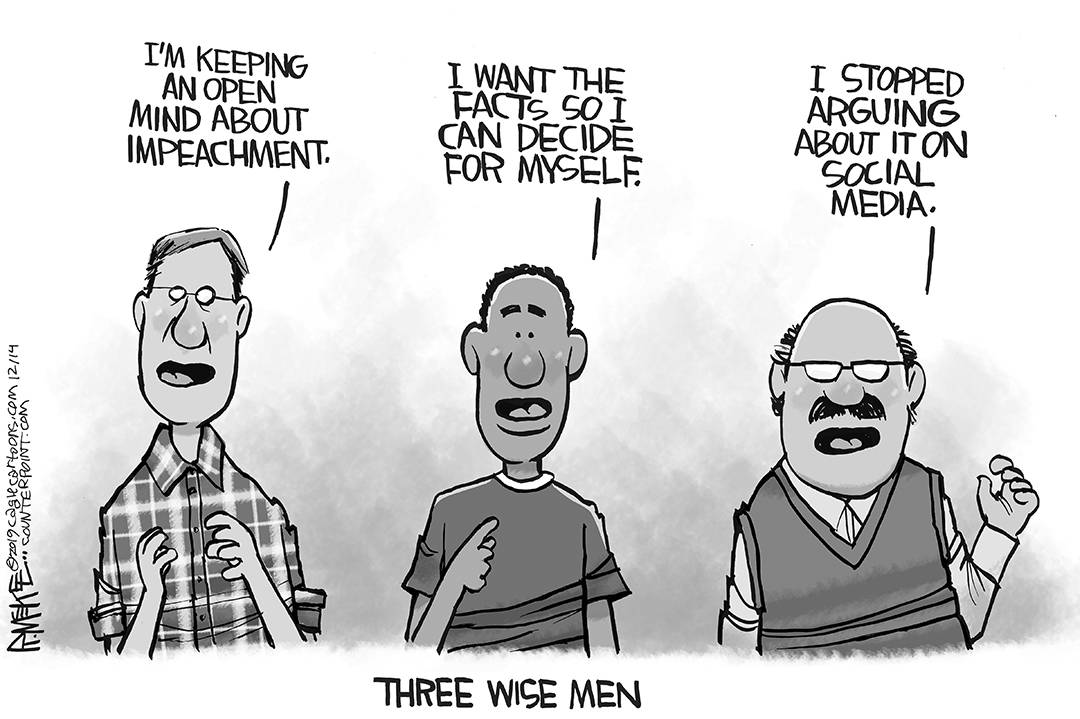By Rich Lowry
Never has history felt less consequential.
The impending impeachment of President Donald Trump is, as news accounts and blaring newspaper headlines tell us, historic. This is true by definition, since a president has been impeached only twice before in 230 years.
But everyone knows that this history isn’t going to matter much. In fact, the day after the Senate trial ends in inevitable acquittal, everything goes on exactly the same as before (except for vulnerable House Democrats from Trump districts, who will have to defend their votes until November).
Impeachment won’t occasion any significant new jurisprudence on executive privilege or the line between executive or legislative prerogatives.
It hasn’t produced any particularly memorable TV. The witnesses before Adam Schiff’s Intelligence Committee were damaging, but not nearly as compelling as any of the true insiders that it would have taken time and litigation to try to get, like Mick Mulvaney or Rudy Giuliani. By the last round of witnesses before the Judiciary Committee, staff lawyers were testifying and questioning one another in a strange and pointless exercise.
It hasn’t gripped the nation. No one is going to say years from now, “I remember where I was when Donald Trump hate-tweeted Ambassador Marie Yovanovitch.”
It hasn’t generated any momentum in public opinion since Nancy Pelosi announced the inquiry, instead settling into an evenly split stalemate utterly characteristic of the partisanship or our era.
Democrats are genuinely outraged by Trump’s conduct in the Ukraine affair, which is indeed indefensible, yet the focus on Ukraine still feels pretextual. Many Democrats have long wanted to impeach him and latched onto Ukraine because it offered the possibility of a quick and easy investigation and vote. It is not an unexpected turn in our politics, rather the inexorable working out of the hostile reaction to Trump beginning immediately after his election.
It is telling that even Democratic presidential candidates aren’t particularly invested in impeachment. They pay it lip service but don’t talk about it very much on the campaign trail, even though they are all to a man and a woman excoriating about Trump. They all understand that he isn’t getting removed from office short of one of them actually defeating him in next year’s election.
Pelosi, too, knows the score, which is why she unveiled articles of impeachment nearly simultaneously with the announcement of a deal to pass the successor to NAFTA, the USMCA. These two acts are, to put it mildly, in tension.
On the one hand, House Democrats are saying that Trump is such a threat to the integrity of the 2020 election that he has to be impeached urgently — so urgently that it’s too risky to pause and try to gather evidence from firsthand witnesses or resolve basic matters of fact.
On the other hand, the House Democrats are giving Trump a legislative achievement that, at the margins, will help him win the very election that they want him disqualified from.
The odd impeachment-USCMA combination makes impeachment look, in part, like an exercise in coalition management. By impeaching Trump, Pelosi is giving her base what it always wanted; she’s making it up to her moderates by giving them the bipartisan accomplishments that they’ve always wanted. As an exercise in practical politics, this is entirely understandable, but the approach doesn’t jibe with the apocalyptic anti-Trump rhetoric deployed to justify his impeachment.
Ultimately, impeachment is going to get swallowed up by the news cycle like everything else. It will leave a mark, becoming a line in Wikipedia and any other capsule account of the Trump presidency. In short order, though, it will seem like an event from a distant epoch. A new outrage will emerge, dominating press coverage for a few days, to be replaced by another in the well-established pattern of the Trump era.
How historic is an event, really, if a month afterward the course of American politics is completely unchanged?
Rich Lowry has been the editor of National Review since 1997. He’s a Fox News political analyst, writes for Politico and Time He is on Twitter @RichLowry.


